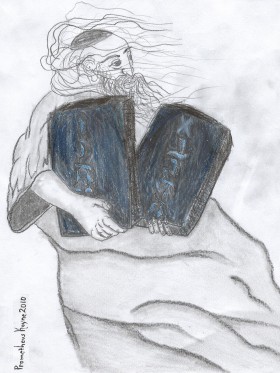
ב''ה
 Subscribe to our
Subscribe to ourQUESTION : Can’t a Noahide (or any human being) just live as a good person in their own eyes, deciding right and wrong based on their conscience?

ANSWER : A person should strive at all times to live and act in accordance with G-d’s Will. It is thus incumbent on a person to learn what G-d’s Will is (as revealed by His true prophets and righteous sages), since He, in His infinite wisdom, did not choose to program this knowledge into us from birth, but rather that we should acquire and assimilate this knowledge through the process of education.
There is no guarantee or even expectation that a person’s inherent feelings of “conscience” will automatically be aligned with the Divine Will, since each person is influenced greatly from the outside by the secular outlook and the immoralities of the society around him, and from the inside by his own passions and self-interests.
The Lubavitcher Rebbe, Rabbi Menachem M. Schneerson, explained this in a letter of response (October ’72) to an individual who raised this very question (printed in the “L’Chaim” publication, #318, May 20, ’94). The Rebbe wrote:
This is to acknowledge receipt of your correspondence.
You write that you would love to learn what it means to walk in the presence of G-d, etc. I trust that you know of the so-called Seven Commandments given by G-d to Noah and his children. These are:
1) the establishment of courts of justice; 2) the prohibition of blasphemy; 3) of idolatry; 4) of incest; 5) of bloodshed; 6) of robbery; 7) of eating flesh cut from a living animal. These Seven Commandments which G-d gave to the children of Noah, i.e. to all mankind, are the basic laws, with far-reaching ramifications, which embrace the whole life of society as well as of the individual, to ensure that the human race will be guided by these Divine laws of morality and ethics, and that human society will indeed be human, and not a jungle.
To be sure, Jews, the children of Abraham, Isaac and Jacob, were later given many more Divine commandments which obligate them, but not the rest of mankind. However, this in no way diminishes the fact that Gentiles can and must attain complete fulfillment through the observance of the above-mentioned Seven Commandments, with all their ramifications, for, inasmuch as they are G-d-given, they provide the vehicle whereby to attain communion with G-d, and thus ‘walk ever in the presence of G-d,’ as you write in your letter.
I would like to make an additional essential point. If there was a time when some intellectuals thought that there was no need to connect the laws of ethics and morality with Divine authority, inasmuch as these are rational principles, the fallacy of this thinking is now abundantly clear. For we have seen, in our own day and age, a whole nation which had boasted of great philosophic advancement and ethical systems sink to the lowest depth of inhuman depravity and unprecedented barbarism.
The reason for this was that they thought that they could establish a morality and ethics based on human reason, not subject to the authority of a Supreme Being, having themselves become a super race, as they thought. There is surely no need to elaborate on the obvious.
From what has been said above, it is clear that no individual can rest content with his own observance of the Divine Commandments, but it is his responsibility to his friends and neighbors, and society at large, to involve them in the observance of the Divine Commandants in daily life and conduct.
This is very well explained in the following address by the Lubavitcher Rebbe. (The following was translated from the original Yiddish by Rabbi Y. Oliver, and is presented here with his permission.)
If one wishes to ensure that mankind act justly and righteously, it must be founded upon observing the Will of the Creator and Director of the world!
I wish to point out the theme of the Ethics of the Fathers: Although this tractate deals with ‘matters of piety,’ i.e., ethics and proper character traits, the Tanna [author of the Mishnah] emphasizes at the tractate’s outset: ‘Moshe received the Torah from Sinai.’ The reasoning behind this is ‘to tell you that the ethics and morals [in this tractate] were not thought up from their hearts [i.e., out of thin air] (as was the case with the ethics invented by the non-Jewish sages), but these too are from Sinai.’ [Commentary of Rabbi Ovadiah Mi’Bartenura, on Ethics of the Fathers 1:1]
This is the only guarantee of actual behavior according to morality and proper character traits. This is relevant both for oneself, and when influencing others, as the Mishnah continues, ‘Establish many students.’ This surely applies to mankind as a whole: The only way to guarantee just, righteous conduct is not an ethical system based on human reason, but on the fulfillment of the Will of the Creator and Director of the world.
As Maimonides says: ‘[…He is considered a Pious Gentile] only when he accepts them and fulfills them [i.e., the Noahide Commandments] (not out of intellectual conviction, but) because the Holy One, blessed be He, commanded them in the Torah and informed us [i.e., the Jewish people] via Moses, our teacher [that non-Jews are obligated to follow these laws].’ [Mishneh Torah, Laws of Kings, 8:11]
This is similar to our Sages’ statement: ‘If one is told that non-Jews possess wisdom, believe it. If one is told that non-Jews possess Torah [i.e. of their own, not received from the Jews], disbelieve it.’ [Eicha Rabbah, 2:13] Wisdom alone (without any connection to actual behavior) is not necessarily related to the Giving of the Torah, so non-Jews can enjoy inherent possession of it. Torah, however, which denotes an instruction [from G-d] that is actually put into practice, is only present [originally] among the Jewish people, by virtue of the Giving of the Torah. The Jews are the ones who must influence non-Jews in this when it comes to the Noahide Code.
May it be G-d’s Will that all will increase in all the above, both in spreading Torah and Judaism among Jews, and in spreading the seven Noahide Laws among all the world’s inhabitants.
Words that emanate from the heart will surely penetrate the heart and accomplish their effect. This surely applies when we demonstrate a living example in our personal behavior in all matters of goodness and holiness. In this way each person will merit to see the fine fruits of his labor. This is a teacher’s greatest reward – seeing his student go in the path he was taught, coming closer and closer to the Creator and Director of the world by actually fulfilling His Will, until the student himself becomes an ‘illuminating candle,’ ‘moist enough to transmit moisture’ [i.e., transmitting his or her knowledge and enthusiasm about Torah and the Noahide Commandments to others].
Let us occupy ourselves with all this with a sense of newness, with the same enthusiasm that we would fulfill a command newly given from Sinai, in the words of our Sages, ‘He who studies Torah, G-d studies opposite him.’
Through this we accomplish that ‘The world will be filled with the knowledge of G-d’ [Isaiah, 11:9] as much as possible during exile, and we hasten the complete fulfillment of this prophecy, with the arrival of our righteous Moshiach, may he come and redeem us and take us upright to our land – with an upright posture, with firmness and pride (but not arrogance, G-d forbid), at the tremendous privilege of being G-d’s emissary to make the world into ‘a dwelling place [for G-d] in the lower realms [this physical world],’ and with joy and gladness of heart.
– Source: Hisvaduyos 5744, Vol. 4, pp. 2169-2170

The Lubavitcher Rebbe, Rabbi Menachem M. Schneerson